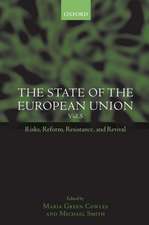Italy and the European Union: Brookings-SSPA Series on Public Administration
Autor Federiga Bindien Limba Engleză Paperback – 7 ian 2011
Federiga Bindi provides, for the first time, an in-depth analysis of Italy's role within the European Union (EU) in this inaugural volume of a book series published jointly by the Brookings Institution Press and the Scuola Superiore della Pubblica Amministrazione (Italian National School of Public Administration, or SSPA). Italy and the European Union relates in detail the historical, cultural, and sociological factors that have led to Italy's incomplete "Europeanization," or full integration, within the EU. It also brings the reader up-to-date on the steps taken by the country's leaders to improve Italy's standing and become a more effective member in the organization it helped to found.
Discussing the author's extensive research, The Economist notes....
"Federiga Bindi identified a number of barriers to an effective European policy in Italy: a high turnover of governments; coalition partners with conflicting aims; the failure of bureaucrats to learn from other member states; and politicians' lack of interest in Europe... recently however, she found that matters had improved. An interdepartmental body for the coordination of EU policies has been created, Parliament operates an effective scrutiny system..., the administration has learnt to learn from others. But the other problems remain, and they are formidable. Her study ends on an exasperated note: 'Italy appears to be stuck in the age of the Guelphs and the Ghibellines, in which the victory of one faction over another is what counts, and the fact that this may be damaging to the country matters little.'" —from The Economist, July 31, 2010
Discussing the author's extensive research, The Economist notes....
"Federiga Bindi identified a number of barriers to an effective European policy in Italy: a high turnover of governments; coalition partners with conflicting aims; the failure of bureaucrats to learn from other member states; and politicians' lack of interest in Europe... recently however, she found that matters had improved. An interdepartmental body for the coordination of EU policies has been created, Parliament operates an effective scrutiny system..., the administration has learnt to learn from others. But the other problems remain, and they are formidable. Her study ends on an exasperated note: 'Italy appears to be stuck in the age of the Guelphs and the Ghibellines, in which the victory of one faction over another is what counts, and the fact that this may be damaging to the country matters little.'" —from The Economist, July 31, 2010
Preț: 272.69 lei
Nou
Puncte Express: 409
Preț estimativ în valută:
52.20€ • 56.72$ • 43.87£
52.20€ • 56.72$ • 43.87£
Carte tipărită la comandă
Livrare economică 21 aprilie-05 mai
Preluare comenzi: 021 569.72.76
Specificații
ISBN-13: 9780815704966
ISBN-10: 0815704968
Pagini: 246
Dimensiuni: 152 x 229 x 17 mm
Greutate: 0.34 kg
Editura: Brookings Institution Press
Colecția Brookings Institution Press
Seria Brookings-SSPA Series on Public Administration
ISBN-10: 0815704968
Pagini: 246
Dimensiuni: 152 x 229 x 17 mm
Greutate: 0.34 kg
Editura: Brookings Institution Press
Colecția Brookings Institution Press
Seria Brookings-SSPA Series on Public Administration
Notă biografică
Federiga Bindi is a senior fellow with the Center for Transatlantic Relations at Johns Hopkins University's SAIS, Washington D.C. A Jean Monnet Chair in European Political Integration and founding director of the European Centre of Excellence at the University of Rome Tor Vergata, Bindi is also professor of European Union Governance at SSPA. Among her previous books is The Foreign Policy of the European Union: Assessing Europe's Role in the World (Brookings, 2010).
Descriere
A Brookings Institution Press and Scuola Superiore della Pubblica Amministrazione (SSPA) publication
Federiga Bindi provides, for the first time, an in-depth analysis of Italy's role within the European Union (EU) in this inaugural volume of a book series published jointly by the Brookings Institution Press and the Scuola Superiore della Pubblica Amministrazione (Italian National School of Public Administration, or SSPA). Italy and the European Union relates in detail the historical, cultural, and sociological factors that have led to Italy's incomplete "Europeanization," or full integration, within the EU. It also brings the reader up-to-date on the steps taken by the country's leaders to improve Italy's standing and
become a more effective member in the organization it helped to found.
Discussing the author's extensive research, The Economist notes....
"Federiga Bindi identified a number of barriers to an effective European
policy in Italy: a high turnover of governments; coalition partners with
conflicting aims; the failure of bureaucrats to learn from other member
states; and politicians' lack of interest in Europe... recently however, she found that matters had improved. An interdepartmental body for the coordination of EU policies has been created, Parliament operates an effective scrutiny system..., the administration has learnt to learn from others. But the other problems remain, and they are formidable. Her study ends on an exasperated note: 'Italy appears to be stuck in the age of the Guelphs and the Ghibellines, in which the victory of one faction over another is what counts, and the fact that this may be damaging to the country matters little.'"
—from The Economist, July 31, 2010
Federiga Bindi provides, for the first time, an in-depth analysis of Italy's role within the European Union (EU) in this inaugural volume of a book series published jointly by the Brookings Institution Press and the Scuola Superiore della Pubblica Amministrazione (Italian National School of Public Administration, or SSPA). Italy and the European Union relates in detail the historical, cultural, and sociological factors that have led to Italy's incomplete "Europeanization," or full integration, within the EU. It also brings the reader up-to-date on the steps taken by the country's leaders to improve Italy's standing and
become a more effective member in the organization it helped to found.
Discussing the author's extensive research, The Economist notes....
"Federiga Bindi identified a number of barriers to an effective European
policy in Italy: a high turnover of governments; coalition partners with
conflicting aims; the failure of bureaucrats to learn from other member
states; and politicians' lack of interest in Europe... recently however, she found that matters had improved. An interdepartmental body for the coordination of EU policies has been created, Parliament operates an effective scrutiny system..., the administration has learnt to learn from others. But the other problems remain, and they are formidable. Her study ends on an exasperated note: 'Italy appears to be stuck in the age of the Guelphs and the Ghibellines, in which the victory of one faction over another is what counts, and the fact that this may be damaging to the country matters little.'"
—from The Economist, July 31, 2010






















